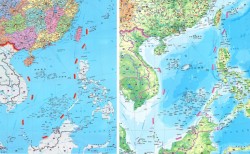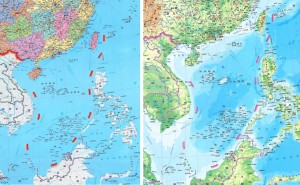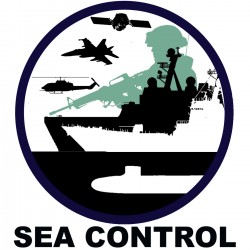Maritime great power politics is back and here to stay. Hence, the EU needs to adapt and rediscover geopolitics in developing its new European Maritime Security Strategy (EMSS). Although hard power matters most, Europe’s naval decline is likely to continue: less money, less navies. To be nevertheless a serious player, the EU has to adapt a smart-power approach. Most important is that the EU says what it does and does what it says.
Time to Leave Strategic No Man’s Land
 |
| Source: EUISS Report No. 16, p. 17 |
As the EMSS is about “security”, the Baltic and the North Sea do not matter (when Russia tries to provoke, so what?). These are NATO/EU inland seas and, therefore, only subject to regular politics and not to military considerations. What should concern Europe are the Arctic, the Indo-Pacific, and primarily the Mediterranean. The Gulf of Guinea is an area of operational, but not of strategic concern. Piracy can be tackled by regional actors with international support.
The Arctic’s emerging geopolitical relevance is stressed by the relatively high number of applicants for observer status in the Arctic Council. In May 2013, the EU suffered a serious defeat, as Brussels’ application was rejected, while China, India, Italy, Japan, South Korea, and even Singapore became observers. For the EMSS it has therefore to be said, that there is no military role for the EU in the High North. Sweden and Finland are Arctic Council members, but without direct access to the Arctic waters. What matters for the EU are trade routes and resources. Thus, an EMSS should define how the EU can contribute to safe and secure Arctic shipping lanes and how Europe’s resource interests can be preserved. After the rejection, however, it is clear that EU will not be one of the major players in the High North. Instead, other theaters should receive more attention.
 |
| Indian Navy show its two carriers (Source: WiB) |
The Indo-Pacific should be of great concern for the EU. Due to China’s and India’s naval rise along with the growing seaborne trade, the Indian and Pacific Oceans have to be seen as one theater. Moreover, there is an emerging Asian power web made by bi-, tri-, and multilateral maritime security partnerships among Indo-Pacific states. The EU’s interests in Indo-Pacific security are primarily motivated by economics. In 2012, the total value of goods shipped from Europe to Asia was 816 billion Euros. While the EU can and should play a role in the Indian Ocean, the EU will hardly become relevant East of the Malacca Strait. The EU has been rejected three times as an observer at the East Asia Summit. Thus, an EMSS has to put a strong emphasis on the Indian Ocean and the Persian Gulf, but it also has to accept that EU will remain irrelevant between Singapore and Vladivostok.
Only France and Britain could make themselves relevant in maritime East Asia. However, while current budgetary constraints remain they will only choose to go there in case of a major incident. During its disaster relief operation on the Philippines, the Royal Navy demonstrated that the UK is still capable of acting East of Malacca. However, the British posture also showed the Royal Navy’s limits. Moreover, it can be ruled out that Paris and London develop some kind of EU maritime security altruism and make an expeditionary EU presence a national priority. Instead, both will allocate their expensive warships to operations concerning their national interests, but not to EU (or NATO and UN) tasks.
Hence, the EMSS has to outline what European states want to do together in the Indo-Pacific and what not. It does not make any sense to write high expeditionary ambitions into a strategy, when it is clear from the beginning that those who have the means for implementing have no interest in doing so. But less can be more. The EMSS should contain realistic and credible ambitions in the Indo-Pacific, making the EU an actor who says what it does, and does what it says. Otherwise, the EU is doomed to irrelevance East of the Suez. In addition, the EU has to withstand the seduction of new free-riding with maritime stability and security provided by Asian powers. There is no guarantee that those powers will remain friendly to European interests.
Most important for the EU is the Med. Not only due to the refugee issue, but also by the new great power plays in the Eastern Med. Russia has returned as a serious naval actor with its largest expeditionary operation since 1991. New conflicts about offshore gas will emerge. Moreover, the growing instability in North Africa from Tunisia to the Suez Canal demands EU action. Therefore, Brussels’ main challenge will be to define in the EMSS how the EU wants to cooperate further with its Med partners. In addition, the EMSS has to say how EU aims to contribute from the maritime domain to stability ashore. Although terrorism, proliferation, human trafficking, illegal migration, and organized crime are subject to the EU’s maritime agenda, the solutions are to be found on land, not on the waters.
Dealing with New Maritime Powers
After the USSR’s collapse, only the United States and EU countries, in particular Britain and France, possessed the monopoly on long-range power projection. Up to now, there has been no other country able to go for Falklands War-style missions. This is going to change. While France and Britain are struggling to keep their capabilities alive, others – especially China, Russia and India – are preparing themselves for expeditionary missions, such as Russia’s expeditionary Med deployment. In terms of expeditionary power projection, Australia, Brazil, Japan, and South Korea could become more capable players, if their governments decide to pursue that track. Rather than focusing on security challenges, EMSS has to address how Europe wants to deal with emerging naval powers. Of course, cooperation for promoting common interests, like safe and secure sea-lanes or mutual trust-building, should be a top priority. However, Brussels tends to see the world too much through pink glasses, where the world becomes good by itself as long as there are talks about multilateralism and global governance. Although the maritime environment could remain friendly to EU interests, due to great power politics this cannot be taken for granted. Therefore, the EMSS has to address how the EU will react (it will not take the initiative) in case of fundamental state-driven changes to a maritime environment that are hostile to European interests.
Thus, advancing partnerships with like-minded democracies like India, Japan, Australia, and South Korea has to be an EMSS priority. Other potential partners include Singapore, Indonesia, and New Zealand. Cooperation with China is likely to be more difficult as recent Chinese actions (ADIZ) showed that Beijing’s approach continues to become much more assertive.
EU’s Aims
Defining realistic and achievable aims for the EU is that simple: stability, security, safety, and prosperity. Stability is the most important of all aims. It enables the flow of trade and the opportunities of doing non-hard power related politics. However, stability requires security and safety. Those three lead to the fourth aim: prosperity by the maritime domain as an area that provides trade lanes and resources. For the EU, it does not matter who owns what. However, Europe’s interest is the absence of conflict. Hence, an EMSS has to outline an increased portfolio of cooperation and trust-building programs.
Europe’s Means
NATO vs. EU? How to Deal with the US?
 |
| Standing NATO Maritime Group 1 (Source) |
There was never a real reason why both NATO and the EU had to have maritime operations in the Gulf of Aden. But both organizations wanted to be part of the international maritime beauty contest. In the future however, Europe cannot afford two organizations doing the same thing. Therefore, work-sharing between the EU and NATO should look like this: while the EU is good at civilian missions and smart power, NATO has decades-old naval hard-power experience. Hence, the modus vivendi should give the EU the softer and civilian tasks, while NATO gets the hard power jobs; Europe will likely become less capable in hard power anyway and only NATO provides access to the needed U.S. assets (and maybe British assets, too, if the UK leaves the EU) and NATO’s Standing Maritime Groups.
However, NATO’s real maritime worth is that the alliance links Britain, Canada, Turkey, and Norway to European security. The UK is drifting apart from EU, but the Royal Navy will remain the most capable of all European navies. Meanwhile Turkey is an indispensable partner in the Med, as are Canada and Norway in Arctic. All four countries continue to invest in their naval capabilities.
Dealing with Decline
 |
| Chinese frigate Yangcheng in Limassol, Cyprus (Source) |
To secure the destruction of Syria’s chemical weapons, China’s navy is now operating from Cyprus, an EU member state, in the Eastern Med. Yes, it is only access to a port for supplies and it is only on a tactical level. Nevertheless, it is remarkable that while the EU is not taken seriously in Asia, China shows the flag in Europe’s homewaters. Never before has a non-Western power conducted tactical operations from an EU member state.
In addition, in 2012, Japan’s premier minister Shinzo Abe invited Britain and France to come to the Asian maritime security theater. Nine years after the ESS endorsement it was quite humiliating for the EU that it was not the Union herself, but rather two nation states that were asked. Due Europe’s economic and demographic problems, European (maritime) decline is real and it is likely to continue.
To 2030
Up to 2030 the competition for resources and economic growth will increase the global sea-lanes’ importance, foremost in the Indo-Pacific, and be matched by the relevance of navies will go along with that. Moreover, by 2030 China, India and Russia (and perhaps others) will operate navies capable of medium- and long-range power projection. China then could posses the capabilities to fight (and win) Falklands-style wars.
Economically, China will have surpassed the United States as the world’s largest economy, and European economies will have dropped back in the global economic hierarchy. The consequence will be that Europe will not be able anymore to conduct operations like Libya 2011. Moreover, European power projection will be balanced by the emerging naval power of others. Thus, it essential that the EU enhances its partnerships with the United States and NATO and, moreover, creates new partnerships with like-minded democracies, in particular India.
Digitization and robotics will lead to the fact that coming generations of naval systems can do even more than today, however, they will be even more complex and therefore more expensive in procurement and maintenance. Europe’s budgetary situation will make the joint development, procurement and operation of new naval system a necessity. If this does not happen, Europe will simply disappear from the maritime domain as a serious, capable actor. In addition, it is likely that emerging navies, in particular China, will have the financial means to generate new high-end warfare assets, which will negatively affect Europe’s power.
With France on the march into an even worse economic mess, the EU’s maritime power projection will largely depend on Britain – as long as the UK remains an EU member. Britain’s coming carriers and other high-end warfare capabilities (SSN, SSBN, Type 26 frigates) will be critical for Europe to be capable and taken seriously in international maritime power politics. In this regard, the worst that could happen is that London decides to sell the second carrier to an emerging navy (e.g. Brazil). For the maritime balance of power, the second carrier must remain British (or European in some way) or, if it is sold, it has to be given to a like-minded country (e.g. Japan or Australia).
After 2030, China is likely to and India could maybe reach the naval power status of the Soviet Union in the 1980s. This means the capability of global power projection and the ability to conduct at least one high-intensity operation. We will see scenarios where emerging navies conduct expeditionary power projection operations, while Europe will be incapable of doing anything if there is no reversal of current trends.
What to Do?
Felix Seidler is a fellow at the Institute for Security Policy, University of Kiel, Germany, and runs the site Seidlers-Sicherheitspolitik.net (Seidler’s Security Policy). This post appeared in its original form here.
Follow Felix on Twitter: @SeidersSiPo


 The specter of nationalism in the Far East looms over ownership of the
The specter of nationalism in the Far East looms over ownership of the 


 Matt Hipple is joined by Zack Elkaim and James Bridger to talk about rebellions in Africa: the Central African Republic, Mali, and Nigeria, as well as the future prospects for Somalia. Today’s podcast is one of our best, and we highly encourage you to give it a listen. Enjoy our latest podcast,
Matt Hipple is joined by Zack Elkaim and James Bridger to talk about rebellions in Africa: the Central African Republic, Mali, and Nigeria, as well as the future prospects for Somalia. Today’s podcast is one of our best, and we highly encourage you to give it a listen. Enjoy our latest podcast,